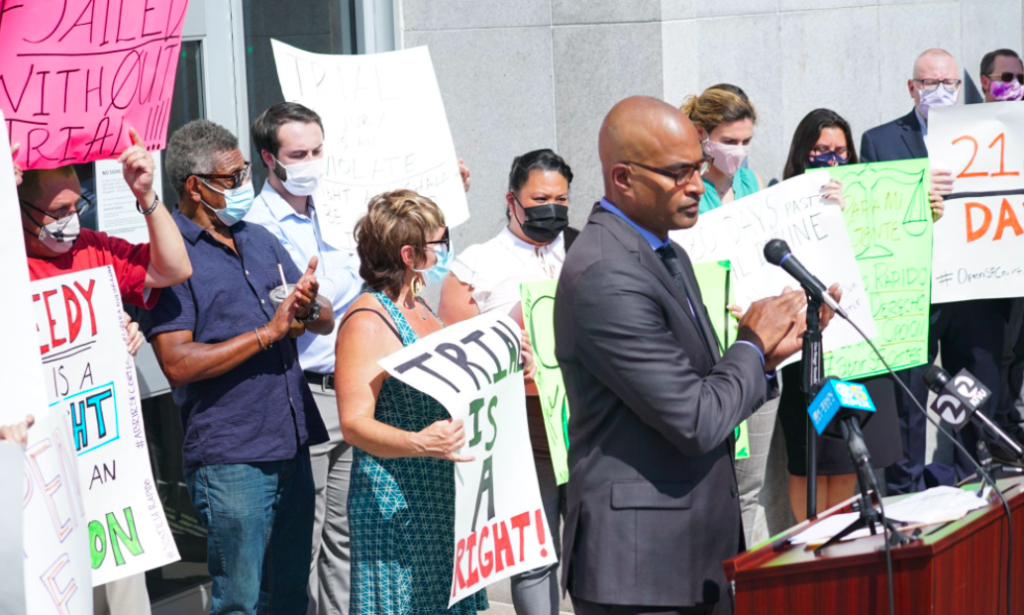The San Francisco Public Defender’s Office is suing the local Superior Court and its presiding judge for failing to open courtrooms to criminal defendants who have been held without trial far longer than the state allows.
It’s a bold strategy that will rely in part of public pressure: The public defender is asking the court to hold itself accountable for a clear legal and policy failure.

Mano Raju argues in his case that the Superior Court is holding civil trials while allowing criminal defendants to sit in jail, often locked in their cells 23 hours a day, without access to their day in court.
All of those defendants, of course, are innocent until proven guilty.
By law, in most cases a felony defendant has a right to go to trial 60 days after an arraignment; for misdemeanors, the rule is either 30 or 45 days.
In serious cases, defendants often waive that right to give their lawyers time to do the investigation and prepare for a complex trial.
But Raju says that many of his clients are ready to go to trial—but the Superior Court judges are routinely delaying trials for long periods of time.
There are, he says 429 people whose cases have gone past the statutory deadline, and 178 of them are locked in jail.
The courts by law can’t prioritize civil cases (which just involve money) over criminal cases, where someone’s freedom is at stake. As Raju’s complaint notes:
This humanitarian crisis stems from the Superior Court’s now-routine practice of continuing criminal cases for months past their statutory trial deadline, and its refusal to use courtrooms in the Civic Center Courthouse to clear the resulting massive, and now growing, backlog of criminal cases. As a result, more and more people are forced to stay in jail while the Court holds jury trials in asbestos cases, malpractice actions, and other civil disputes for money damages without regard for the rights of the criminally accused to receive a speedy trial.
Oh, and the courts are handling eviction cases.
From the complaint:
Penal Code section 1050(a) requires courts and judges to “expedite [criminal] proceedings to the greatest degree that is consistent with the ends of justice.” It provides that “criminal cases shall be given precedence over, and set for trial and heard without regard to the pendency of, any civil matters or proceedings.”
And the courts have clearly said they are ready to handle cases:
During a January 2021 “State of the Court” webinar with members of the civil bar, Defendant Judge Feng announced: “Everyone is ready to go . . . So that makes it easier, as opposed to telling everyone we only have one courtroom. Are you kidding? No, we have all courtrooms. Everyone is available for jury trials and/or bench trials; we’re all equipped for it. We’re ready to go.”
One of the issues is the availability of courtrooms. The rooms at the Hall of Justice, where most criminal cases are heard, can be smaller and are limited. But the newer courthouse at Civic Center has more, and larger, rooms.
A year ago, when I asked Ken Garcia, the court spokesperson, how the judges were going to handle eviction trials at Civic Center, he told me:
At the Civic Center Courthouse, we do indeed have courtrooms that can accommodate everyone needed for a trial (you left out plaintiff and defendant) and still meet social distancing requirements.
But most of those courtrooms are limited to civil cases—for reasons that are not entirely clear. The presiding judge has said that security is an issue (the jail is at the Hall of Justice)—but Raju says that many criminal trials have been held at Civic Center without any security issues.
The human costs are very real:
Emonie Bailey is a San Franciscan detained in jail who never waived his right to a speedy trial. He has been in custody since May 14, 2020, and his original trial deadline was January 19, 2021. His case was not sent to a trial department for trial until August 13, 2021, well over a year since his arrest and incarceration. Once sent out to a trial department, his case resolved. Under the jail’s COVID-19 policy, Mr. Bailey was confined to his cell for a minimum of 23 hours a day. Frequent lockdowns meant that he had only been allowed to leave his cell two or three times a week. In the fourteen months that he had been detained, he had been deprived of in person-visits with his family. Such isolation can cause permanent mental, emotional, and physical harm.
In other words: Once a trial is set, the District Attorney’s Office is much more likely to settle with a plea bargain.
And as the courts deal with civil matters and don’t provide speedy trials for people accused of crimes, Raju said, the situation is just going to get worse.
“People are dining in nice restaurants, going to cafes, shopping in malls. But the right to freedom takes a back seat.”







